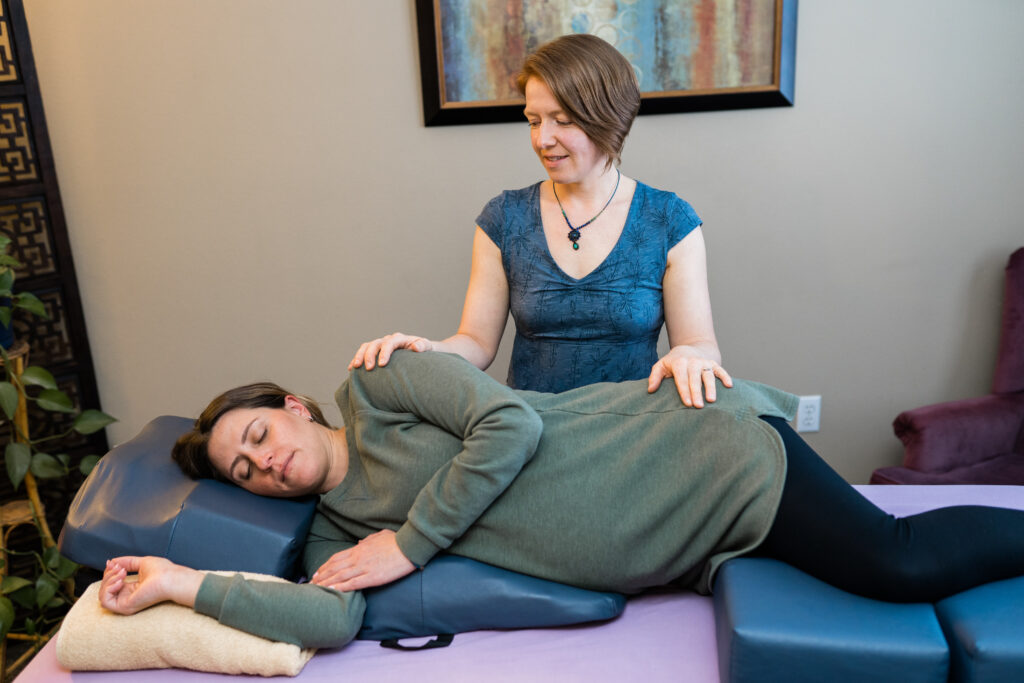Acupuncture for Morning Sickness
What is Morning Sickness?

- Nausea and vomiting during pregnancy is often called “morning sickness” despite occurring at any time of the day or night.
- Morning sickness is thought to occur in approximately one half of all pregnancies usually between the 6th and 16th weeks. It can be at it’s most intense at 8 to 12 weeks. Some women experience symptoms as early as their 1st delayed period while for others it can last for the duration of the pregnancy. Occasionally nausea and vomiting will reappear (after previously resolving) in the last few weeks of a women’s pregnancy.
- It’s intensity can vary depending on factors such as fatigue and eating habits.
- The main concern is the possibility that vomiting can lead to dehydration and the woman may then require hospitalization to receive intravenous fluids.
How can Chinese medicine help?
Acupuncture offers a real alternative to simply putting up with nausea and vomiting during pregnancy. In the majority of cases it offers a dramatic improvement and puts the woman back in control. It is important to note that no matter how good a woman feels following treatment, the nausea is likely to return if she pushes her body’s limits, for example by eating inappropriate food, skipping regular meals or snacks, staying up late, etc.
- Calms the effects of the pregnancy hormones that are responsible for the nausea and vomiting.
- Promotes rest and relaxation as tiredness and exhaustion will usually heighten any nausea during pregnancy. A woman’s risk of developing morning sickness increases if she is stressed and fatigued prior to becoming pregnant.
- Lessens or eliminates the need for antiemetic medication or admission to the hospital due to dehydration.
- Diminishes the frequency and severity of symptoms with regular visits.
- Lifts the mood if a woman is feeling discouraged, anxious or depressed by the frequency of her symptoms.
Treatment
- Women can usually be treated 2 times in one week initially, and then 1 time per week until they feel confident that there is no further need. This is often around the 12th to 14th week of a woman’s pregnancy or within 2 weeks in women presenting after week 14.
- Ear press needles are a very safe, easy and practical option for “take home” acupressure. The acupuncturist will provide the woman with specifics instructions based on her particular needs.
- Combining antiemetics (taken between acupuncture visits as soon as nausea returns) with acupuncture can control nausea and vomiting with minimal medication.
- Contact your midwife or doctor if there is no improvement.
Diet
- Avoid dehydration. Becoming dehydrated will make nausea more intense even if it seems like drinking doesn’t relieve the nausea.
- Soups are an excellent way to take in liquids. Potato soup is very bland and easy. Won ton soup and vegetable or chicken broths. Herbal teas, especially ginger (not more than 3 cups/day) or peppermint. Carbonated drinks (especially ginger based) can promote belching which may help the nausea. Sucking on ice cubes or watery fruits such as melons and pears may be useful.
- Snacks
- Small regular snacks help keep blood sugar levels stable (every 1-2 hours) before the stomach becomes too empty or you feel to hungry
- Can be small, a few raisins or nuts (almonds), a sandwich or a piece of fruit.
- Overeating can make it worse. Spread food intake over the day to replace previous 3 meals/day.
- Avoid sugary foods (blood sugar issues). Consume fruit, baked potatoes, bread, pasta and rice.
- Carry snacks with you (high protein – nuts, yogurt) snack before bed and consume carbohydrates on waking (toast, crackers).
- Avoid foods that aggravate your symptoms.
- Liquids
- Apple cider vinegar (1 tablespoon of apple cider vinegar; fill the cup w/ boiling water and add honey to taste) chamomile tea, ginger ale, ginger tea (grate a piece of root ginger the size of a thumbnail, steep in boiling water for 10 min and add honey to taste; do not exceed 3 cups/day) mineral water w/ lemon juice, peppermint tea, potato soup, umeboshi plum tea (half a tsp of umeboshi paste stirred into a cup of boiling water, add honey to taste).
- Foods
- Almonds, baby rice (made from dried rice flakes that are cooked w/ water to form a porridge), crackers, dried fruit (especially apricots and raisins), egg sandwiches, grapefruits, yeast extract, miso, noodles, pasta, peaches, pears, peppermints, potatoes (in any form), commercial baby food, white bread, yogurt (acidophilus).
Lifestyle
- Rest
- It’s easy to overwork in the beginning of a pregnancy.
- Arrange time for rest each day during the time you feel most nauseous.
- Start work an hour later or arrange for extra child care for a few weeks.
- Go to bed early if needed.
- Smells
- Essential oils can be helpful. Peppermint may be helpful when you wake/
- Vanilla can be used in the kitchen.
- Lemon can be used when out in public.
- Medications and supplements
- Combining antiemetics (taken between acupuncture visits as soon as nausea returns) with acupuncture can control nausea and vomiting with minimal medication.
- Take a B complex or B6 supplement.
Other resources
Handouts
Nausea during pregnancy handout
Research
Nausea & vomiting in early pregnancy
Nausea & vomiting
